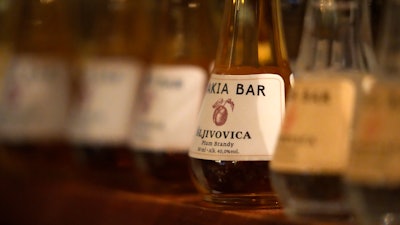
ROZANCI, Serbia (AP) — Forget whiskey or cognac. For Serbs, nothing beats homemade sljivovica, a plum brandy they hope will win U.N. recognition soon as an example of an important cultural tradition.
Sljivovica (pronounced SHLI'-vuh-vitsah) has been handcrafted — and consumed — in Serbia for centuries, a custom carried from generation to generation that experts say has become part of the national identity.
The tradition remains widespread in rural areas of the Balkan country despite a boom in modern distilleries and brands. U.N. cultural agency UNESCO is expected to decide this month whether to include "social practices and knowledge related to the preparation and use" of the spirit to its list of the world's intangible cultural heritage.
Sociologist Ilija Malovic says sljivovica is a typically Serbian product because it is derived from a locally grown fruit — plums — that is widely available, and because the brandy is made and enjoyed within families and local communities.
Serbs drink sljivovica when they celebrate, mourn, welcome guests and mark important events, Malovic explained. People have always stashed away their best bottles for weddings, the birth of a child and funerals, he said.
"It (sljivovica) always has been tied intimately to family," Malovic, who is an editor of a blog about local fruit-based spirits known as rakija.
"Sljivovica is part of people's lives from beginning to end, and has always been part of this nation's identity," he said.
These days, sljivovica is also an important Serbian export and a local tourist attraction. Small businesses producing sljivovica and other fruit brandies have sprouted in recent years, offering modern packaging with ethnic-style designs.
For improved quality, sljivovica is sometimes kept in oak barrels that give it a brownish, whiskey-like color and a somewhat bitter taste. And, it gets better with age.
In the central Serbian village of Rozanci, Miroslav Milosevic makes his own sljivovica, using plums from the family orchard and a technique that his father and grandfather used before him.
A peek inside Milosevic's backyard shed reveals a distillery that includes metal barrels, wood-fueled stoves and white cotton clothes through which the final product is filtered.
Milosevic says he makes a pure, high-quality spirit for himself and the friends and relatives to whom he gives a few bottles.
"Our elderly used to say it's like a medicine," he smiled. "You drink one small glass and it's a cure."






















